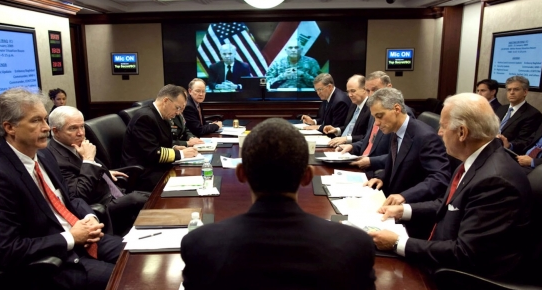The Way We New York Gossip Now
Is New York’s Golden Age of gossip fading, or simply in a period of retrenchment? The Village Voice takes a good look.
Fire Island Labor Day Weekend Looks Ruinous For Gays!

Suffolk County will decide whether to issue a “mandatory evacuation” for Fire Island today, which is an annoying thing, because whether it gets stormy or not over the course of the week, that means there’s still no ferries running. (And you don’t want to get driven onto the island in a storm surge; it’s hairy!) But that may all be moot, since the LIRR is just now barely running properly again, after a fire put service on the fritz for a week. Gays! Return to your seaplanes! Remember when you weren’t victims of public transport?
Cee-Lo Green, "F**k You"
Here’s the official video for Cee-Lo’s beloved late summer smash. It’s very good-looking-pastel and neon vintage diner decor. (Though maybe not as good-looking as the original typeset treatment?) My favorite part is when Cee-Lo throws the ol’ from-the-chin Italiano-style kiss-off. Vaffancul!
Your Ball-Sweating, Record-Breaking Summer
We did it, New York: HOTTEST SUMMER EVER! See you next summer-and every one thereafter-when we do it again.
"The World’s Caught Up To Antony Hegarty"

“In 2010, specimens like Ke$ha and Katy Perry straddle the upper reaches of our charts with one-note braggadocio and sledgehammer double-entendre about their nether regions, no matter-in the typically autistic onanism of the perplexed alpha-minus male-how few listeners care or how many retch. Cracked ingénues born, fatally, before the Berlin Wall or Manuel Noriega went down, they jostle for whatever neonate mindspace goes uncolonized by the class of Justin Bieber, the teen idol from Canada and YouTube whose perverse sexlessness has stretched wholesome marketability toward the sinister indeterminacy of, say, Cathy Rigby as Peter Pan.”
–Everyone in music culture-society wants to be a girl-boy, boy-girl too.
Secretive Maybe-Gay British Spy's Cause of Death Also A Mystery

The strange case of Gareth Williams, the British spy found dead and padlocked inside a sports bag, with the phone numbers of gay escorts scattered about his apartment, is getting stranger. Let’s see: “The cause of his death has still not been established despite two post mortems being carried out. There were no obvious injuries on his body.” Also! “His position regularly took him to the US where he liaised with the National Security Agency and the CIA and he is also reported to have made a number of visits to Afghanistan.” And of course, there is a friend who claims the spy was plagued by “demons.”
Train Man Settles For Bus
Add another chapter to the sad story of Darius McCollum, who was, perhaps inevitably, arrested for the 27th time yesterday after procuring a Trailways bus in Hoboken and driving it to Queens. McCollum, whose first collar came at the age of 15 when he commandeered an passenger-filled E train at midtown and drove it down to the World Trade Center, apparently told the arresting officer that, “I’ll bet they won’t leave the keys in the ignition. I’ll bet they’ll be more careful now.”
Tony Blair: Tough On Wine, Tough On The Causes Of Wine

“The relationship between alcohol and Prime Ministers is a subject for a book all on its own. By the standards of days gone by I was not even remotely a toper, and I couldn’t do lunchtime drinking except on Christmas Day, but if you took the thing everyone always lied about — units per week — I was definitely at the outer limit. Stiff whisky or a G&T; before dinner, couple of glasses of wine or even half a bottle with it. So not excessively excessive. I had a limit. But I was aware it had become a prop. I could never work out whether for me it was, on balance a) good, because it did relax me or b) bad, because I could have been working rather than relaxing. I came to the conclusion — conveniently you might think — that a) beat b). I thought that escaping the pressure and relaxing was a vital part of keeping the job in proportion, a function rather like my holidays. But I was never sure. I believed I was in control of the alcohol. However you have to be honest: it’s a drug, there’s no getting away from it.”
-Former British Prime Minister Tony Blair admits to being troubled by the amount of alcohol he consumed to help soothe the burdens of office. It really makes you wonder how George W. Bush dealt with the responsibility of sending so many to their deaths in a conflict of choice without the comfort of liquor. Blair, at least, had his half-assed drinking to ease the way.
The American Experiment on the Last Day of the War
by Mike Barthel

According to the government, the war in Iraq ends tonight at midnight. Given the war’s inescapable presence in our politics over the last eight years, you would think we’d take this as the occasion for, if not celebration, at least some sort of commemoration. But so far, there’s not even been much media coverage. Earlier in the month, the Pentagon staged a nighttime movement of combat troops from Iraq to Kuwait, timed to coincide with the evening news broadcasts, but aside from cutaways on NBC’s cluster of channels (with some definite enthusiasm from MSNBC), it received about as much attention as a state visit to Senegal. A factoid about the impending end of aggressions made it onto the cable networks’ bottom-of-the-screen crawl on Saturday, but then it was topped literally and figuratively by Glenn Beck’s elaborate prank on Washington. Tonight, Obama will make with the official End of the War speech, to who knows what kind of ennui. No only do people think that the substantial residual force remaining in Iraq means that the occupation is continuing, many just simply seem to not believe the government when it says that the war is over.
Now, granted, this is the same institution that lied repeatedly (though, let’s be honest here, not particularly convincingly) to the public about the war. Why should we believe them now?
For one thing, all the leaders are actually different; even the lone Bush holdover was less known for supporting the war than for bringing it to a close. Rumsfeld, Bush, and Cheney have been removed from office and have been repudiated politically by Obama’s election. It’s a totally different government, and they’re doing what they promised: ending the war.
And yet many don’t believe the leaders we have now. Even more than that, we don’t care. After all, if either side thought this could be used as a football or a hammer, it’d be all over the news.
Do we just want to forget the whole thing happened? Has the war in Iraq and the relationship between Americans and our government that it produced been so normalized that declaring it over seem as ridiculous as declaring sadness over? Do we just think this is how it’s going to be, forever?
The major political story that we have to tell about the last decade is that of the 9/11 attacks and our response. That includes the foreign policy response (Afghanistan, Iraq, Abu Ghraib, Guantanamo, rendition) and the domestic response (the PATRIOT act, warrantless wiretapping, immigration crackdowns, the expansion of the security state, probably Katrina somehow), because they’re all of a piece. When something occupies a central place in our political discourse for so long, importance or timeliness are necessary but insufficient conditions.
Rather, our national focus turned to this story because it served as an exemplar, something that could be used not to debate ideological disagreements, but to resolve fundamental differences between our expressed values and the actions taken on our behalf.
Because as politically unusual as our 9/11 story was (our former president seemed determined to ignore almost every truism that presidential scholars had discovered, and suffered the consequences), our response to 9/11 did not represent anything unusual in terms of policy. This was pretty much what George W. Bush’s government would have done anyway. To rattle off a few things we all already know: Cheney wanted to attack Iraq on the morning of September 11, 2001; the Bush family has a long entanglement with Iraq and their regional enemies stretching back for decades; 9/11 was used as an excuse to push through a foreign policy strategy Rumsfeld and others had been developing since the Ford administration and a theory of executive power that David Addington had been pursuing just as long; it goes on.
But those dark acts are tied up unavoidably with other aspects of the American government we feel more comfortable benefiting from as citizens. Iraq fits into the general thrust of American foreign policy, and while imperialism is a dirty word on much of the right and the left, its outcomes are more ambiguously valued. Some hate that our military has been reduced to a vehicle for ensuring the continued flow of oil, but we do like all the things oil makes possible. How can we resolve American values with the apparent need to guarantee our consumer cornucopia with lethal force?
And the expansion of presidential (and vice-presidential!) power is part of a larger movement over the course of the 20th century, from government merely protecting rights to government actively helping people. We might not like government “helping” us by reading our e-mail, but we do like the government helping us to, say, health care or Social Security. (Even the ones who say they oppose all government programs aren’t usually, in practice, foes of Social Security.) Without that fundamental shift away from small government, neither warrantless wiretapping nor Medicare would be possible.
Bush pushed these long-simmering conflicts to such an extreme that they represented a kind of crisis point. We could no longer ignore the fact that the way our government was acting fundamentally differed from how we thought the government should act. We either needed to find a new way of doing business, or we needed to be able to explain how our longstanding values actually fit in with our public policy. By bringing that conflict to a head, the 9/11 story became the moment at which a choice had to be made.
And in the end, we chose… well, nothing.
But OK, smart guy, I hear you saying at this point, what are American values? Good question! Here is a fairly good list, a number of which were brought into question by the progress of the Iraq war.
What we thought was a morally obvious situation turned out to be confusingly complex; what we thought would be a triumph for American values turned out to be a failure; and what we thought was a patriotic mission turned out to be an ideology- and clan-driven crusade. There are even more problems with the domestic stuff, given the values of individualism and equality. Maybe this just means these values are stupid and not-American, but I like American values, when we actually bother to follow them; I’m suspicious of patriotism and nationalism, of course, but I do like America, you know? I like America in the same way I like New York City, really, because they have the same values: achievement, individualism, equality, progress. Those values have led to some great things. (And some awful things!) We just need to figure out how to continue to pursue them without, as certain interests would have us do, abandoning everything we’ve done over the last century.
Iraq raised the question without providing an answer. It’s clear that what we did was wrong, but we don’t know what’s right. Conservatives were wrong, sure. But liberals aren’t really right, either. We’re leaving Iraq and it doesn’t seem to be doing any good. There’s still not really any government in Iraq, but we’re leaving anyway. That’s sort of what everyone wanted? But we don’t feel good about it actually taking place.
Without that ending, our decade-long debate lacks a resolution. So what gives? Do we have different values now, ones more in line with what we’ve been doing in Iraq and at home? Or do we still have the old values without actually abiding by them? Or-and this is the option most people seem to be going with now-do we just have no shared values at all anymore?
If that’s the case, then we’re in trouble. Without shared values, we can’t actually talk about politics. Lacking an agreed-upon outside standard for what’s right and what’s wrong, there’s no way to resolve conflicts over policy. We can’t argue about what the best thing is to do when we don’t know what “best” means.
Moreover, there is absolutely nothing the government can do, and very little that Obama can say tonight, that will make us happy. As long as the federal government is pursuing the same general path as it has been for the last fifty years-and given how things have been going, there’s no reason it won’t-it will, in the understanding of the vast majority of Americans, be acting in an un-American way. So it’s no wonder that we don’t believe the government when it says the war is over.
We can have a discussion about whether or not, in strictly factual terms, this ending is really an ending. But it seems to me that declaring the end of the combat mission in Iraq certainly means something. Maybe we’re loathe to admit it, because we just don’t like what that meaning has turned out to be.
Two years ago, it seemed like ending the war in Iraq would fix America, just like it seemed like electing Barack Obama would fix America. Both things are an improvement for the country, but we’re still dissatisfied. Why?
Well, that “fix” is not something we can find in policy. It’s only to be found in the way we think about ourselves. Do we like what America’s doing? Do we think it is, in some way, “American”? If so, how? That’s a hard debate to have. It would certainly be easier to pile up symbolic acts and hope they accumulate into a meaningful heap. But that won’t work, and resolving our own ongoing conflict is a debate we need to have. Otherwise, the great American experiment will have to be abandoned, and then we’ll be just another country.
Mike Barthel has written about pop music for a bunch of places, mostly Idolator and Flagpole, and is currently doing so for the Portland Mercury and Color magazine. He continues to have a Tumblr and be a grad student in Seattle.
